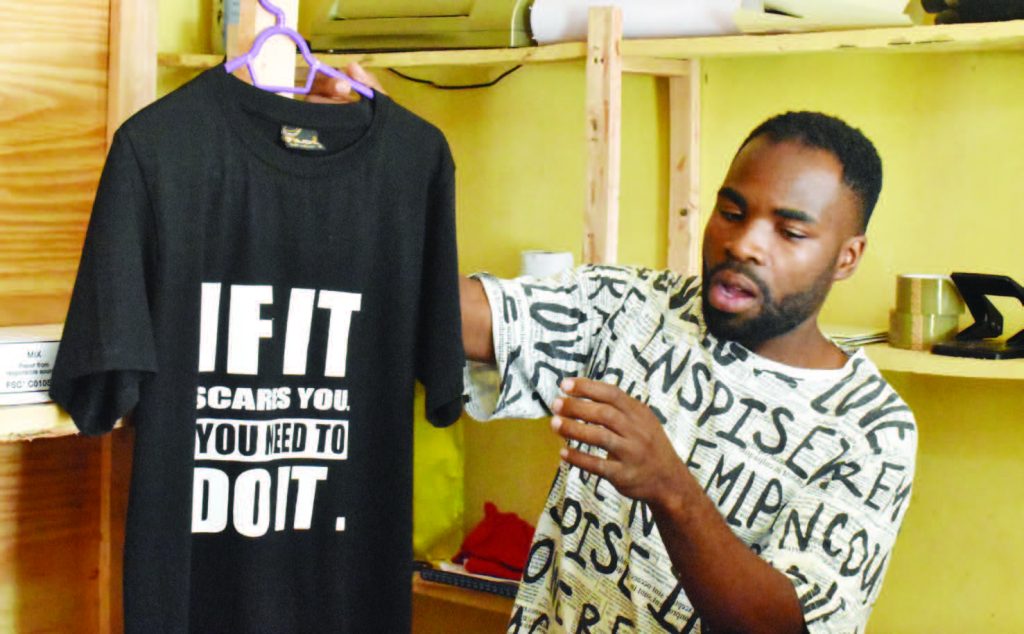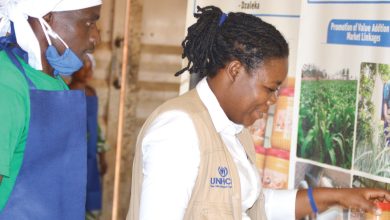Youths get a business boost
In 2025, Donnex Chinomba, 27, left Mulanje District for Mangochi in search of pastures new.
The shift from the foot of Mulanje Mountain to the southern shore of Lake Malawi personified a desperate escape from the country’s massive youth unemployment.

“I hoped my brother, who was working here, would help me get a job, but I spent years jobless. Life was hard. I had to find plan B,” he recalls.
A quarter of Malawians aged 18 to 35, who are looking for employment, cannot find any, reports the International Labour Organisation (ILO).
The youth in Mangochi mostly flee to South Africa in search of casual work.
Chinomba snubbed the exodus unlike busloads of his peers in the fishing district. With an IT diploma from Soche Technical College in Blantyre, he dreamed of opening a computer shop that would design and print various documents, posters, banners and T-shirts.
The dream came true in February when he received K4.25 million after pitching the idea in the Business Acceleration for the Youth (BA4Y) Project funded by the US Agency for International Development (USAid) through CIAT, the International Centre for Tropical Agriculture.
Chinomba was among the 30 young entrepreneurs who pitched their business ideas in Mangochi, one of the disaster-prone districts targeted by the project. The 20 winners received funding and training to start or boost their businesses.
“BA4Y gave me the capital and skills I needed to turn my idea into a life-changing business and become my own boss,” he says. “The training introduced me to how to manage my business, finances and marketing.”
Chinomba used the funds to buy printing machines and other basics.
He mostly markets his unique offerings on the social media amid cut-throat competition from both old-timers and newcomers.
The transformation is unmistakable.
“The business gives me a steady income. Until February, I was living hand to mouth. I couldn’t afford house rentals and healthcare bills. I depended on my brother and sometimes worked as a middleman getting meagre commissions from selling phones, TVs and other goods from my peers in South Africa,” he says.
Mangochi district youth officer Kumbukani Manda says the BA4Y project is incubating a generation of job and wealth creators.
He envisions the businesses transforming the youthful entrepreneurs’ economic fortunes while saving them from crime, substance abuse and risky sex webs fuelled by unemployment.
States Manda: “The impact is huge as the youth who had just an idea are setting up viable businesses and those that were struggling due to lack of capital are growing.
“The youth have winning ideas and the energy to achieve their dreams, but they lack funding. Providing capital not only helps young men, but also women achieve their dreams and avoid risky behaviour which may endanger their lives.”
BA4Y primarily supports business in agriculture, forestry and sustainable fisheries sectors.
However, some of the selected enterprises extend to agro-processing, sustainable energy solutions, ICT, education services and conserving forests.
The five-year project is underway in Mangochi, Balaka, Machinga, Zomba, Chiradzulu, Chikwawa, Nsanje, Mulanje and Thyolo. It seeks to accelerate youth-led enterprises for job creation, greater access to financing, diversified incomes, and a more inclusive private sector. It also aims at strengthening resilience to natural disasters that have become more frequent and devastating with climate change.
According to BA4Y business incubation and acceleration officer Oganive Chingakule, they selected 500 young entrepreneurs from over 5 000 applicants in the nine districts.
“It was a highly competitive selection process, but the key was who demonstrated the most potential and who was driven to utilise the training and grant to turn their pitch into a rewarding business,” she says.
Chingakule hopes the project has surpassed expectations, with talks underway to extend it to more districts.
At first, we thought the entrepreneurs would use the grants to test the market if people would accept their products and explore more funding sources, but many are generating revenue and the range of businesses is beyond our expectation,” she explained.
And Chinomba hopes the government will replicate the youth empowerment initiative beyond the nine disaster-prone districts.
“The youth have innovative ideas and energy to walk out of poverty, but they need support to monetise their ideas,” he says.

